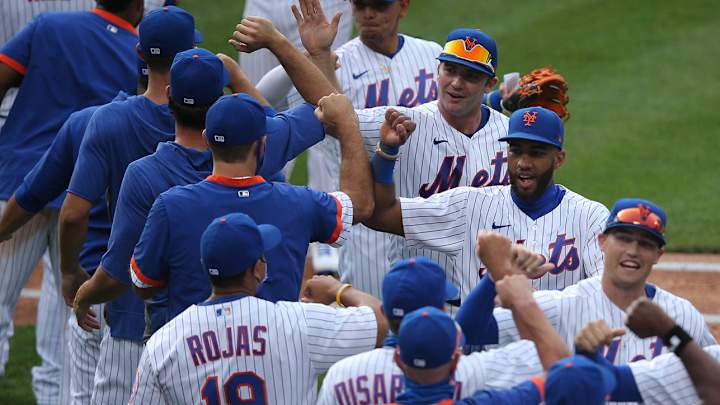How the Mets Can Transform Into Instant Contenders

We’re less than a month into the Steve Cohen ownership era for the Mets, and hope is already brimming throughout Queens. From his delightful Twitter antics to his deep pockets, Cohen’s presence signals a new era for New York’s “other” franchise, one that might be less “Metsian” than it's been in the recent past.
Coming off a disappointing season in which they failed to make an expanded postseason field, the Mets have an opportunity to rapidly turn toward contention this winter. The news last week of Robinson Canó’s season-long suspension could be viewed as detrimental to New York’s 2021 prospects, but it can also open up all kinds of interesting possibilities given Canó’s $24 million salary that will no longer be paid.
Let’s explore some of those possibilities here with four moves the Mets can feasibly make to rebuild themselves into instant contenders.
Sign J.T. Realmuto, C
“Now there’s a creative idea,” you likely aren’t thinking. Granted, this is the most obvious move that any Mets fan with a pulse and a Twitter account could have suggested. But keeping things simple is often the best approach, so we won’t try to reinvent the wheel here. Realmuto is easily the best backstop on the market and one of the best players in this class. The Mets have a cavernous vacancy behind the plate, and Realmuto would instantly make an already superb lineup even stronger.
It might take a record-shattering contract to lure Realmuto in, but a player of his caliber is worth it in the short term. As for the long term? Well, who knows, but we’re trying to build an overnight contender here, not a dynasty (baby steps, Mets fans).
Sign Jake McGee, RP
The Mets bullpen posted a league-worst 12.6% walk rate in 2020. To illustrate the gulf between the Mets and the league’s best, the Dodgers and Rays ranked first and second, respectively, in that category, at 7.1% and 7.8%. Applied over the roughly 1,000 batters faced for each bullpen, that’s an added 55 or so free passes over the course of the season. All those extra base runners came back to bite the Mets, as they went 6–11 in one-run games.
Thankfully, there are a number of viable relievers on the market this year with pinpoint control. McGee is the pick here, though there are other candidates that fit this type (Mark Melancon, Greg Holland and Brad Hand come to mind). McGee, 34, had the sixth-lowest walk rate (3.8%) among relief pitchers last season and the second-highest K-BB% (38.0%). Though it might be tempting to target Liam Hendriks—the top closer on the market—it would be more prudent to shop from slightly lower on the relief pitcher list and save money for other areas of improvement.
Trade for Kris Bryant, 3B
This move is the riskiest of the bunch, but the timing could be right for the Mets to strike on a buy-low, big-name player to add to the lineup—emphasis on buying low. It was a nightmare season for Bryant in 2020, who dealt with a litany of injuries and posted a .206/.293/.351 slash line. He’ll be a free agent after 2021, and his asking price will never be lower than it is now. With Canó out of the picture for a season, Jeff McNeil can play his more natural second base, and Bryant could play third as an upgrade from J.D. Davis.
Bryant’s impending free agency is a positive in this case, meaning he likely won’t cost a ton in prospect capital, and his 2021 salary should be slightly less than what Canó was slated to make in 2021. The Mets could certainly try to upgrade their infield via DJ LeMahieu in free agency, but that will require a multi-year commitment the club might not be willing to make. Landing Bryant in a trade would help maintain payroll flexibility, while adding a potential game-changing bat to an already fearsome lineup.
Sign Charlie Morton, SP
Editor's note: Charlie Morton signed with the Braves on a one-year deal. How about José Quintana or James Paxton?
The Mets already landed the best starting pitcher on the market not named Trevor Bauer when Marcus Stroman accepted the club’s $18.9 million qualifying offer. Stroman, Jacob deGrom and rookie David Peterson form a strong trio, but there’s not much to rely on behind them. Bauer would obviously help, but he’s the most sought-after pitcher on the market, so perhaps a likelier outcome is for the Mets to land Morton.
Morton’s $15 million club option curiously was declined by the Rays after the World Series. He’s been a strong ground-ball pitcher throughout his career, a benefit to a Mets rotation that ranked 27th in that category in 2020 at 39.0%. The 37-year-old isn’t a foundational piece for the future, and he wouldn’t be one of their two (or maybe even three) best starters. But the Mets absolutely need to build rotational depth if contention is at all in the cards next year, so stockpiling on passable innings-eaters will go a long way toward making it through a full season.

Nick Selbe is a programming editor at Sports Illustrated who frequently writes about baseball and college sports. Before joining SI in March 2020 as a breaking/trending news writer, he worked for MLB Advanced Media, Yahoo Sports and Bleacher Report. Selbe received a bachelor's in communication from the University of Southern California.
Follow NickSelbe